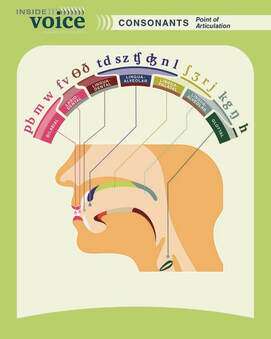
We sing on the vowels. The consonants are just necessary interruptions of the line for diction's sake. The goal in beautiful singing is to interrupt the vocal line as little as possible. This means to minimize the amount of time spent forming the consonants. While some consonants are voiced and it is possible to sustain them on a pitch, it is not desirable to linger on them long. And then there are words that combine long strings of consonants together such as in "clothes" or "helped" or "pleased." And then when many words are strung together with difficult consonants like that you can hardly find a vowel to sing on! (Arrgh! Diction can be frustrating.)
Many consonants in English have both a voiced and unvoiced form. The "s" in LISA and the "s" in PLEASE have the same lip, teeth, jaw and tongue formation, but one has the breath applied to the vocal folds while the other does not. When the "z" is produced, the applied breath on the vocal folds creates PITCH and can be sustained "zzzzzzzzzzzz." Singers can form the "ssssssssssss" sound and can sustain it, but that consonant cannot be pitched.
Some other consonants with both a voiceless and voiced form are:
"p" as in past -------- "b" as in ball
"t" as in time -------- "d" as in dog
"k" as in kick -------- "g" as in girl
"f" as in farm -------- "v" as in vase
"th" as in birth -------- "th" as there
"sh" as in shell -------- "z" as in azure
The point is to allow the voiceless consonants very little time to disrupt the vocal line and to use the voiced consonants to help manage and lock in the pitch. For example, the "d" at the beginning or end of a word, such as in "dog" or "God" need to be pitched on the same note as the "landing" vowel "o" for the word to start and end on pitch. It takes good breath support and concept of pitch center to pull it off.
But what about the American "r"? In most cases, singers simply leave it out. In words such as "heart" and "earth" and "world," singers modify the pronunciation to "hot" and "uth" and "wold." Most "er" endings of words are modified to the schwa (unaccented syllable as in "the"), as well. It may speak strangely, but it sings well. Correcting the clenched jaw of the American "r" is one of the most difficult habits to break. We Americans tend to be lazy speakers. Translating American speaking into beautiful singing can be a real effort and against our nature, but it can be done.
 RSS Feed
RSS Feed